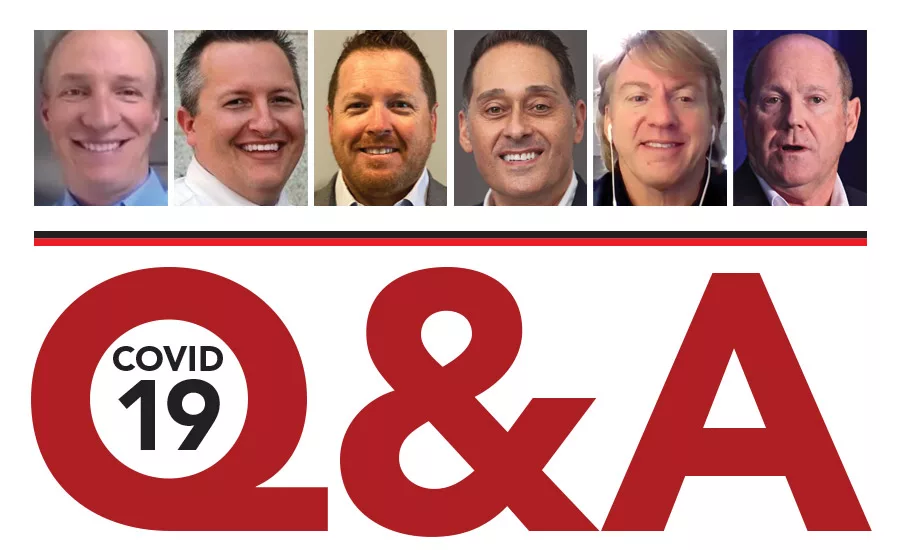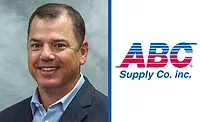Roofing Industry Q&A: Seeking Stability Beyond COVID-19

September marks the sixth-month anniversary since states began issuing mandatory lockdowns to slow the spread of the coronavirus. In that time, roofing contractors and the rest of America’s “essential workforce” gained a new appreciation for technology, crisis communications, flexible business models and largely being able to work remotely or outdoors.
As we continue to cover the rapidly-changing events surrounding the pandemic and try to put their impact into perspective for roofing stakeholders, we’re sharing what leaders across the industry said about how their organizations navigated unusually difficult spring and summer roofing seasons, and what they’re preparing for next.
RC: We’re six months into this crisis. How was your organization prepared for the challenge and ready to help contractors?
Reid Ribble, NRCA CEO: We were mostly concerned about making sure that the essential nature of roofing was recognized by not just the federal government, but state government. As things moved on, we got engaged with making sure Congress included the right types of programs that protected payrolls for the roofing industry, just like everyone else. Now we’re weighing in with Congress about how to use the tax code to reinvigorate the industry by creating tax incentives for consumers at the residential and commercial level to do construction work.
Scott Campbell, VP of sales, West, IKO: I don’t think anyone could have been fully prepared for the challenges that the pandemic brought, but some of our internal processes helped provide us with a natural advantage. Because IKO controls most of the processes and materials that go into making our roofing products, we avoided many of the challenges of supply chain disruption and product shortages that others might have faced, or may still face during these challenging times.
Doug Kramer, president, U.S., Huntsman Building Solutions: First, our reliable supply chain is of great assistance to contractors during this time. Second, the existing information systems in place prior to the pandemic have ensured ongoing and efficient communications even though a majority of our staff is working remotely. Communicating with any of our departments in a time of need remains seamless. Our tech services group is also still active in the field, as we understand business must go on with very close attention being paid to safety, which is always our top priority.
RC: How have you handled contractors’ concerns about supply chain?
SC: We have manufacturing plants strategically located across the U.S. and Canada, several of which were built or completely refurbished over the past 15 years. This investment positions us for quick transportation of product to distribution centers. It also enables us to continue production so long as the proper safety measures are in place.
DK: Our continuity plan has proven very successful and we’ve experienced no disruptions in our supply chain. None of our contractors have expressed concerns, which we believe may be attributed to us not missing a beat. The company has performed even as Houston and other manufacturing areas have been meaningfully affected.
Greg Bloom, VP of national and strategic accounts, Beacon Building Products: It’s an industry-wide issue. Supply chains (for all building products) are stressed right now, and there are a lot of challenges. But the good news is we have a broad network and are in every state. We’re dealing with it and are really working closely with our vendor partners, and of course, our customers.
RC: How has this crisis changed products/services and what enhancements will stick around?
Kevin Earnest, VP of sales, East, IKO: What we sell has not been impacted by the pandemic, but how we sell certainly has. We worked hard to achieve a smooth transition into virtual communication for our sales team and have heard similar feedback from contractors regarding their interactions with homeowners. Their achievements during this time should not be understated; contractors have employed everything from aerial roof measurement tools to online services for quotes and contract signing.
McKay Daniels, NRCA COO: When COVID-19 came onto the scene, we went system-wide, association-wide, looking at all of our processes and procedures and how to better fine-tune, tweak, adjust or totally revamp them for this new socially distanced environment. ProCertification has been one of those. We quickly shifted so that now somebody is able to take that exam in the comfort of their own home, or at the office. They’re able to take it remotely rather than in person at a centralized testing facility.
RC: What are you looking forward to with IRE 2021 now in April?
RR: Let’s face it — at the end of the day, most consumers do not buy from a business, they buy from a person, and it is still a relationship that matters in our world, and I would hope we don’t lose the humanity of what we do. Because that’s what makes IRE work.
MD: The NRCA is going to be doing another ProCertification hands-on both demonstration and tests. The education programs that Informa and IRE puts on are world-class, and you have the best of the best giving you their best practices, and whether you’re relatively new to the industry like myself or a seasoned veteran, you’ll take away something new from one of those sessions, and it is across the entire business spectrum.
KE: Without giving too much away, we plan to build on the momentum that we created at IRE 2020, where we launched two new products. The big takeaway for the audience was that when performance accessories are installed alongside IKO Dynasty or Nordic Performance shingles, these products enhance the weatherability of the roof and further protect homeowners from the elements. We’re also prepared for a virtual show, if necessary.
RC: What are you proudest of about your organization and the industry as a whole?
DK: Our nimbleness and ability to transition quickly under the duress of natural disasters and the pandemic. Shifting our business model and having sufficient existing information systems for communication and business continuity are key to this. Living in Houston, these things are a normal part of our consideration, which helped us prepare for the pandemic.
RR: I think probably one of the things I’m most proud of is that we’ve been able to use our strategic plan as a primary guide for how to conduct ourselves, and that plan has helped focus the entire industry. Not just the NRCA in our efforts, but how the industry reacts and responds. What I’ve seen today as a result of this disaster is a more unified roofing industry than ever before, and people are really locking arms and standing shoulder to shoulder to face this threat.
GB: Our branches are open, we’re servicing our customers, and have not missed a beat. The Beacon Building Products teams have really done an incredible job of coping this crisis. We’ve seen very few contractors suffer horribly with their businesses. I’m so impressed with how the industry has adapted to this crisis. It’s been an inspiration to watch and work with our customers through this. The industry should be proud of what we’ve all accomplished and what we’re going to continue to accomplish.
SC: Agility is one of our core values at IKO. To that end, we are enormously proud of the fact that employees from across IKO — from sales, to manufacturing, to IT and beyond — were able to quickly adapt to a world that changed overnight. As individual team members learned new best-practices, they quickly shared that knowledge with their colleagues, enabling us to all work together safely as one team and one IKO.
MD: The silver lining for me has been seeing the resilience of the industry and its people and knowing, no matter how long COVID lasts — or what socially distance dynamic may be at play — that when we get on the other side of this, the industry and its people will be stronger and better than when we went in.
Looking for a reprint of this article?
From high-res PDFs to custom plaques, order your copy today!







